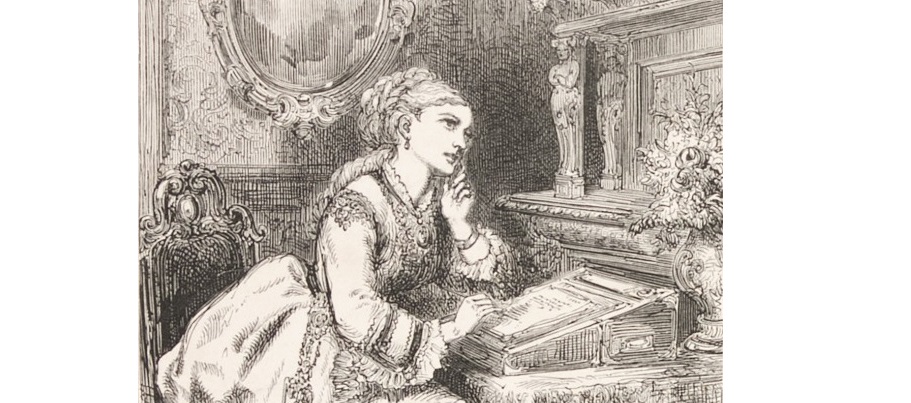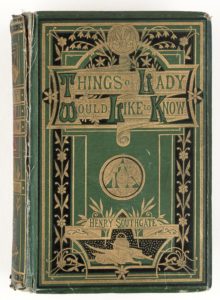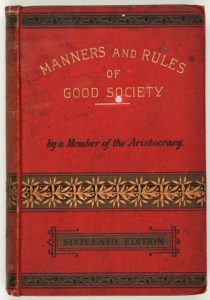
In the nineteenth century, the private world of the home was considered women’s natural domain, while men were free agents outside the home, active in politics and public affairs. Women’s duty as household guardians made a clear separation of the domestic realm and the public sphere. This has been called the ideology of ‘separate spheres’.
For this resource, we have selected a few household management manuals and advice books that give clues as the social prescribing of women in the home in late 19th-century society. Among them, some are aimed at upper-class women, while others target the then growing middle classes.
As you read, here are some questions to think about
- What do you make of the fact that some of these advice manuals were written by men?
- How would you define the power imbalances in society at this time?
- How representative were these images of femininity and lady-like behaviour of women’s lives?
- If you compare them to literature and magazines aimed at women today, to what extent have gender roles changed? You may want to look up some of these magazines: Good Housekeeping; Woman’s Day; Family Circle; Ladies’ Homes and Gardens. Home Journal; Cosmopolitan.
Things a Lady Would Like to Know Concerning Domestic Management and Expenditure, by Henry Southgate, 1874 (BADDA2443)
In this book of 1874, Henry Southgate wrote about the “responsibilities of the home sphere in which woman’s mission is to be found”. His intended readers, he notes, are middle class “countrywomen” whose burden (he predicts) will be “greatly lightened”. The book aims “to make the management of domestic affairs easy and interesting” (p. 7), and so follow 528 pages about cookery and party dinners, to travelling, gardening, recipes for accidents…
It is in the chapter about Deportment where women’s duties as a home-maker are stated most clearly, here are some quotes:
“Mothers should instruct their children, however young, in household matters. […] all the leisure a girl has should be wisely disposed of in healthful exercise” (p. 510)
“A wife at the outset of her career should make it her determination, in every possible way, to gain the sympathies of her husband […].” (p. 511)
“Another duty which a married woman owes to her husband is love to home, and such exertions as are likely to render home attractive to him likewise.” (p. 518)
Southgate also ‘advised’ women on their appearance, as in the section titled “Dress”, which gives you a good sense of the beauty ideals of the time and how to achieve them, including recipes for the hair, chapped lips and hands (using unsalted hog’s lard with egg yolks!). It also advocates against corsets, which disfigures the ‘natural gracefulness’ of women, but also because “great men are not the offspring of tight-laced mothers”. In sum, ideal femininity is such that:
‘Women by nature are beautiful and graceful […] Gracefulness cannot exist without ease; delicacy is not debility; and a sound taste in dress is the fair and beautiful right woman.’ (p. 490)
Manners and Rules of Good Society or Solecisms to be Avoided, 1890 (BADDA2411)
 Finally, Manners and Rules of Good Society (1890) is book of etiquette with advice on how to comport oneself as a ‘lady’ in high society gatherings. It was written by “a member of the aristocracy”, and covers etiquette in balls, wedding, dinner parties, or afternoon tea. Aimed at both men and women, the passages we have selected give you an idea of the social choreography of interactions in the upper classes. The author says that etiquette is “constructed upon the refinement, polish, and culture of years, of centuries”.
Finally, Manners and Rules of Good Society (1890) is book of etiquette with advice on how to comport oneself as a ‘lady’ in high society gatherings. It was written by “a member of the aristocracy”, and covers etiquette in balls, wedding, dinner parties, or afternoon tea. Aimed at both men and women, the passages we have selected give you an idea of the social choreography of interactions in the upper classes. The author says that etiquette is “constructed upon the refinement, polish, and culture of years, of centuries”.
As is clear from the book, “etiquette” regulates behaviour in ways which are clearly gendered. For a man this means charm, courteousness, consideration, kindness; for a woman, it is sweetness and pretty manners. When meeting new people, young women must always be introduced by their chaperon, for they “have not always the discretion possessed by their elders, or sufficient knowledge of the world to do the right thing”. Elsewhere in the book, you learn about how you should comport yourself at dinner parties: for example, some ‘ladies’ do not eat oysters because it is “more ladylike not to eat them”; they should also avoid rich dishes and select “the plainest, as a rule they should not eat a second course, and “as a matter of course young ladies do not eat cheese”.